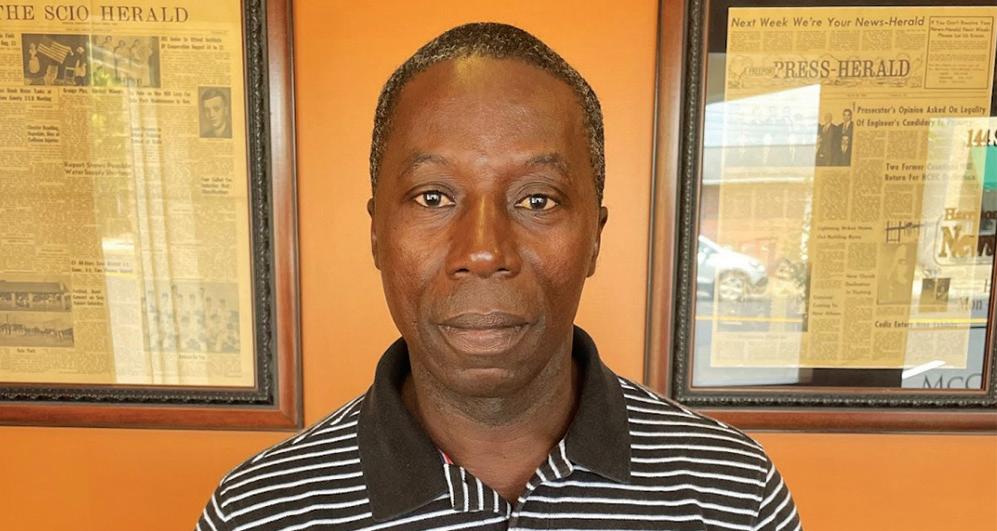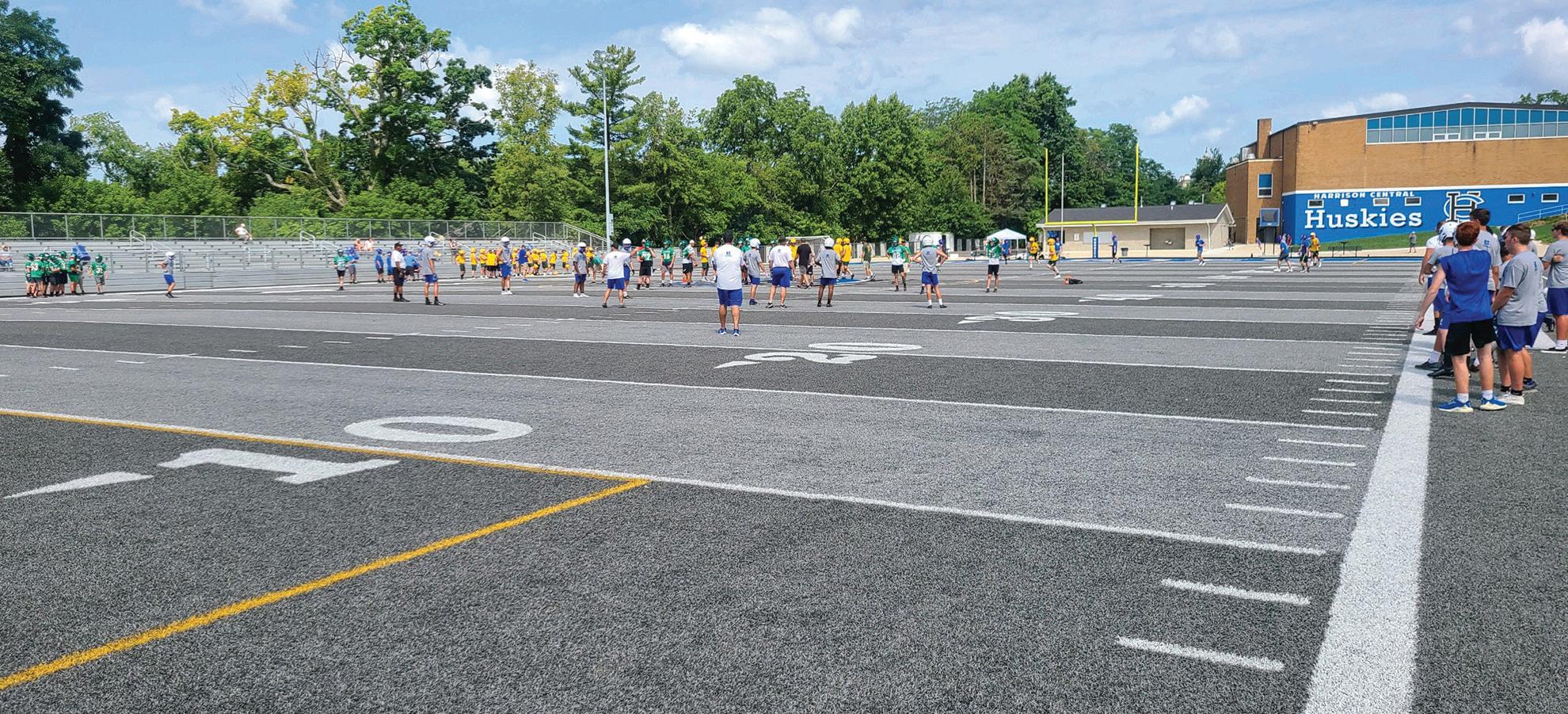
9 minute read
See FARMHOUSE REMNANTS Pg
Kakra Yankah: a Ghanian’s stay in Cadiz
BY TERESA DULAC
Advertisement
Kakra Yankah, 51, is originally from Ghana, located in Africa’s western, sub-Saharan region. Yankah was called to Cadiz, Ohio, to work on a company project just two months ago, and he’s enjoyed it every day. Harrison County has been one of Yankah’s favorite places he’s been sent to work. “I would say my favorite part is the calmness,” answered Yankah. “It’s a place where if you have an aim, you can concentrate. There are not many distractions here to draw you away from your purpose of coming here, which is very good...New York, California, places like that, there’s distractions all over the place.”
Yankah has a wife and three children back in Ghana and is currently in the United States to support them. He plans on going back at the end of the year to spend Christmas with his family. He notes that it is difficult to be away from them, but that he’s become accustomed to a life of international travel.
Growing up, Yankah and his siblings attended school first in Ghana and then in Cuba. His parents did all they could to ensure the success of their children—and that they did. His twin brother went on to become a chemical engineer and his sister, a pediatrician here in the states. “I went up to junior high in Ghana,” shared Yankah, “then I continued in Cuba: junior and senior years of high school and then university in Cuba. I got [a college degree in] electrical engineering in Cuba, a Bachelor of Science.”
Yankah has previously been working in the United States for some time now, and has been sent to places like North Dakota and Kentucky for his job. But he says he is happy to now be located in Ohio. His international travel has brought him many diverse experiences, but he draws similarities between Harrison County and his home country. Yankah comes from one of nine major tribes in Ghana, the Fante tribe, who place a lot of importance on their freedom and their families, much like midwest Ohioans. “Ghana was the first Saharan country to have their independence,” said Yankah. “It’s pretty much something that we brag about and talk about, that we’re known for being one of the first African countries to have their independence.”
Yankah also noted the complications of language and cultural barriers, and that his faith in God is how he overcomes those difficulties. “There are people sometimes who say, ‘Oh, I have never heard of Ghana before,’ then other places where they know what it is. People have different mentalities, different perceptions. I have been to places where people have asked me when I talked about Ghana, ‘Do they have electricity?’. I never take offense because I understand that we are not the same. We were not grown, raised in the same place,”
He explained that Ghana has many tribal symbols that conceptualize mannerisms, phrases, or ideas. For example, there are symbols for words such as “justice,” “freedom,” and “knowledge” in Ghana. Yankah’s favorite symbol is “Gye Nyame,” which represents the supremacy of God over all — even his struggles. “Out of all the tribes, nations, there’s only one person,” explained Yankah. “That symbol represents God, the all-omnipotent God, the creator of the universe.”
Yankah mentioned that those misunderstood interactions have been happening less and less in Cadiz. He said he is appreciative of the friendly atmosphere of the locals and is grateful for the town’s peaceful nature. “You know, America is a diverse cultural country, people from different countries, people from different backgrounds, plus, it’s a dream country,” Yankah added. “I’ve been around the country quite a bit, and when I do the comparison, I can see how people around here are very friendly...I’ve been to so many other states, but the people here are very sociable!”
Harrison County and the surrounding area is quickly becoming a home away from home for Yankah. “I don’t know if I’ve been able to go everywhere around here, but so far, I’ve been to restaurants. There’s one called Ranch to Table,” recalled Yankah. “Looking around, that was the first place I was thinking, ‘That was good food.
Harrison County may be quaint, but that doesn’t affect the ambience of the small town of Cadiz, Ohio — nor does it affect Kakra Yankah’s enjoyment of it. “I was told it [Cadiz] used to be livelier back in the day,” concluded Yankah, “But you know, despite this place being small, there’s a lot going on.”
Photo provided by Teresa Dulac Kakra Yankah, hailing from Ghana, Africa, has recently been assigned to work in Cadiz, OH. He brags that Harrison County is one of the “kindest places in the United States” in his experience.
WASHINGTON — The U.S. Department of Agriculture (USDA) is providing up to $200 million to provide relief to timber harvesting and hauling businesses that have experienced losses due to COVID-19, part of USDA’s Pandemic Assistance for Producers initiative. Loggers and truckers can apply for assistance through USDA’s Farm Service Agency through Oct. 15, 2021. The Agency administers the Pandemic Assistance for Timber Harvesters and Haulers program (PATHH) in partnership with the U.S. Forest Service. The Consolidated Appropriations Act of 2021 authorized the assistance for the timber industry. Timber harvesting and hauling businesses that have experienced a gross revenue loss of at least 10% from Jan. 1 to Dec. 1, 2020, compared to Jan. 1 through Dec. 1, 2019, are encouraged to apply.
“USDA’s Pandemic Assistance for Producers initiative promised to get financial assistance to a broader set of producers, and today’s announcement delivers on that promise,” said Secretary Vilsack. “On top of the existing challenges associated with natural disasters and trade, the pandemic caused a major disruption for loggers and timber haulers, including lack of access to wood processing mills. This industry plays a critical role in our nation’s economy, and we are proud to support these hard-working loggers and truckers as they get back on track.”
“Like many facets of the agriculture industry, the logging industry has experienced its share of financial hardships throughout the pandemic,” said FSA Administrator Zach Ducheneaux. “We’re happy to work with the U.S. Forest Service to develop this new program to provide critically needed support.”
“We’ve heard from loggers and truckers whose livelihoods were significantly impacted this past year by the COVID-19 pandemic, and we are pleased that USDA can help alleviate some of the financial burden,” said Forest Service Chief Vicki Christiansen. “I encourage those logging and log-hauling businesses hardest hit by the pandemic to learn more about the assistance offered through this new program.”
To be eligible for payments, individuals or legal entities must be a timber harvesting or timber hauling business where 50% or more of its gross revenue is derived from one or more of the following: cutting timber, transporting timber, processing of wood onsite on the forest land (chipping, grinding, converting to biochar, cutting to smaller lengths). Payments will be based on an applicant’s gross revenue received from Jan. 1 through Dec. 1, 2019, minus gross revenue received from Jan. 1 through Dec. 1, 2020, then multiplied by 80%. The Agency will issue an initial payment equal to the lesser of the calculated payment amount or $2,000 as applications are approved. Then, a second payment will be made after the sign-up period has ended based upon remaining PATHH funds. But the maximum amount that a person or legal entity may receive directly is $125,000.
Loggers and truckers can apply for the Harvesters and Haulers program by completing form FSA-1118, the Pandemic Assistance for Timber Harvesters and Haulers Program application, and certifying their gross revenue for 2019 and 2020. Additional documentation may be required. Visit farmers.gov/ pathh for more information on how to apply. Applications can be submitted to the Agency office at any USDA Service Center nationwide by mail, fax, hand delivery, or electronic means.
Harrison Central hosts football scrimmage

Harrison News-Herald Photo/ED BANKS On Monday, four football squads were in Cadiz to take part in a seven-man offensive scrimmage. The teams represented during the scrimmage included Barnesville, Beallsville, Brooke, and host Harrison Central. The offensive scrimmage is designed in a way to allow the team’s offensive units and pass defenders to exercise their game while featuring quarterbacks, receivers, defensive backs, and linebackers. Pictured are Harrison Central’s defensive backs and linebackers as they defend against Barnesville. In the background are Brooke and Beallsville in the same mode, with Brooke on offense.
FARMHOUSE REMNANTS FROM PG.-1

Harrison News-Herald Photo/JD LONG The storefront of Farmhouse Remnants is ready. It’s a perfect showcase of what the Cumberworths can create. While the inside is still in progress, the display is a microcosm of what the store will eventually become. The Cumberworths, by chance, were able to procure an antique sorting table from the post office that is becoming their new Farmhouse Remnants site.
That’s the MO for Farmhouse Remnants: seeing the potential in the old and giving it new life. “Some pieces we’re not going to repurpose, we’ll bring it back to life. But we might not repurpose it totally, just clean them up because they’re beautiful pieces,” Holly emphasized. Holly and Brian both talked about the history of their passion project-turned-livelihood, and it’s been not only a labor of love but also one that paid the bills. “It was a way of life for us,” explained Holly.
The Cumberworths frequented various flea markets, shows, and exhibits, picking up new items with a bit of flair or selling the latest projects that had been finished. And they gained a lot of momentum in their days with their repurposed and upcycled pieces. Notably, they were stocked in department stores, like Macy’s and Harry & David, showcased on the Los Angeles Times’ front page, and became a favorite in Myrtle Beach. “We lived comfortably, [but] there were times when we left home with a few bucks with the promise of making a lot of bucks,” Brian stated. There were some gambles along the way, and both Brian and Holly agreed. “Hey, this [building] is a gamble,” Brian added. While both recognized they were rolling the dice on their newest venture, they were assured. The setting is different, but the mission is the same for Brian and Holly Cumberworth. They’ll fix up the old post office and laundry mat into Farmhouse Remnants, taking the old and making it new. Then they’ll take the remnants from the farmhouse, spruce them up, and give them new life, too.

TRANSPARENCY INTEGRITY FAIRNESS
Grow your business






